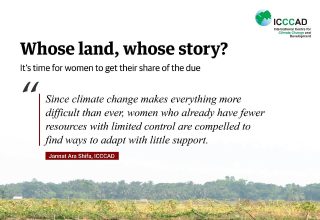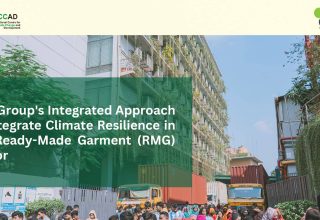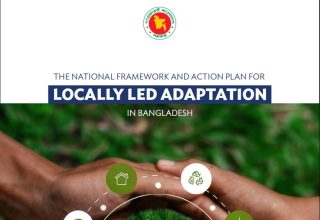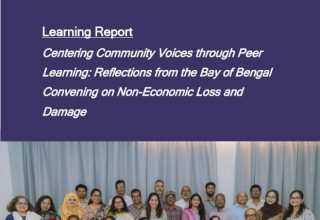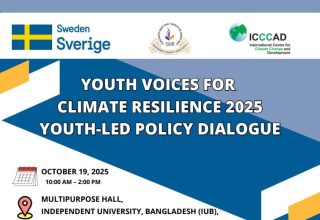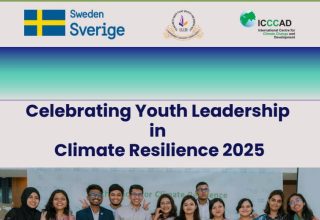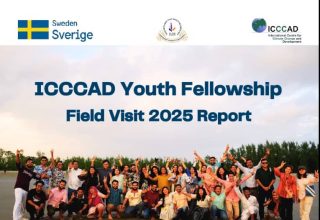
In the last few weeks, there has been an alarming rise in heatwaves. According to the Bangladesh Meteorological Department (BMD), temperatures are expected to rise above 40°C in parts of Bangladesh.
In 2024, the warmest temperature on record broke previous trends. The World Meteorological Organization (WMO) defines a heatwave as a prolonged period of excessively hot weather, often lasting up to two months, with temperatures significantly higher than seasonal averages. These extreme events threaten human health, economic stability, agricultural productivity, and overall well-being.
Bangladesh’s scenario is not unique, and its geographical features make it highly susceptible to the impacts of climate change, which threatens Bangladesh’s economic stability, accelerates migration, and leads to livelihood losses.
Bangladesh’s RMG sector
According to the Export Promotion Bureau (EPB), Bangladesh’s ready-made garment (RMG) exports accelerated by 7.23% in 2024, climbing to $38.48 billion from $35.89bn in 2023.
Currently, this sector faces major climatic threats such as heatwaves during summer.
The poor working conditions in small-medium-sized factories exacerbate the health and well-being conditions of the workers during climatic hazards such as heat stress.
For instance, the workers face increased incidents of heat-related illnesses such as fatigue, dehydration, and heatstroke. These incidents also undermine their mental well-being, further reducing productivity. Heat exhaustion is most common amongst individuals between 36 and 65, mainly female garment workers, during episodes of heat waves.

The women workers face a triple crisis during heatwaves due to the responsibility of balancing unpaid burden care work (ie, responsibility of household chores and taking care of their children); maintaining their roles at the factories; getting tired and stressed for limited accessibility of medical care or relief.
Unfortunately, mainstream discourse neglects this interlinkage of climate change and public health to the gender-specific ramifications.
During the monsoon season, the RMG sectors’ workers also face difficulties in commuting to and from work.
Often, they face health implications due to waterlogging leading to water-borne diseases, cold and flu, which also increases their absence during those rainy months. Lack of social protection schemes, weak bargaining power, long work hours, minimal knowledge gap on climate change and its interlinkage with labour rights make both men and women workers more susceptible to the impacts of climate change.
Addressing these disparities is not only a matter of equity but also of economic necessity. If left unaddressed, the compounded effects of heatwaves on health and labour will continue to undermine productivity, strain healthcare systems, and impede Bangladesh’s long-term development.
The solution
The absence of coordinated efforts among key stakeholders — including employers, employees, government institutions, and trade unions — has led to fragmented responses. Differing priorities and a lack of interlinkages further hinder the development of effective, inclusive strategies.
In the light of this, the International Centre for Climate Change and Development (ICCCAD), in collaboration with the Laudes Foundation, is implementing a 3-year project on “Capacitating the Garment Industry Workers for a Greener Transition in Bangladesh.”
The initiative aims to ameliorate workers’ rights through unfolding the nexus between labour rights, climate change, and just transition within the Ready-Made Garments (RMG) sector.
This initiative focuses on applying a multi-stakeholder approach to empower the RMG sectors’ key players, such as the factory management and garment workers, on climate change issues and adaptation measures. This project adopted an interactive approach which ensures garment workers are active co-creators of solutions.
The climate change training module is currently being designed with insights from the workers’ lived realities during heatwaves and instances of waterlogging, reflecting a “learning by doing” philosophy.
ICCCAD will also conduct social dialogue to share the findings from the workers’ training sessions with the garment companies, government bodies and ministries, and buyers for policy reformation incorporating the nexus of climate change and labour rights to improve the climate resilience at factories.
By providing them with adequate knowledge, the initiative aims to improve workers’ voices and decision-making capabilities to be active agents of climate action and bring the long-due systemic improvements in labour standards.
Government partnerships
In December 2024, the financial agreement between Bangladesh and Germany under the Joint Declaration of Intent for the Bangladesh-German Climate and Development Partnership aims to support local governments in improving urban infrastructure through climate-sensitive planning.
The Government of Bangladesh can harness this strategic partnership with Germany to scale up capacity-building initiatives for enhancing the climate resilience amidst rising trends of heatwaves in the RMG sector, to increase its exports and workers’ well-being. This effort also serves as a call for broader collaboration.
Addressing climate-related labour risks requires coordinated action among governments, industries, and civil society bodies. Only by working together can we ensure a just transition that uplifts workers while advancing economic and climate resilience for achieving a just transition.
Furthermore, capacitating RMG workers through inclusive education and multi-stakeholder dialogue is not only vital for raising their productivity and well-being at the households and factory levels but essential for ensuring a just transition in Bangladesh’s most critical export sector.
Originally this article was published on July 22, 2025 at Dhaka Tribune.
About the Author
Afsara Binte Mirza is working in the International Centre for Climate Change and Development (ICCCAD) as a research officer. Nafia Saddaf is working in the International Centre for Climate Change and Development (ICCCAD) as a junior research officer.

